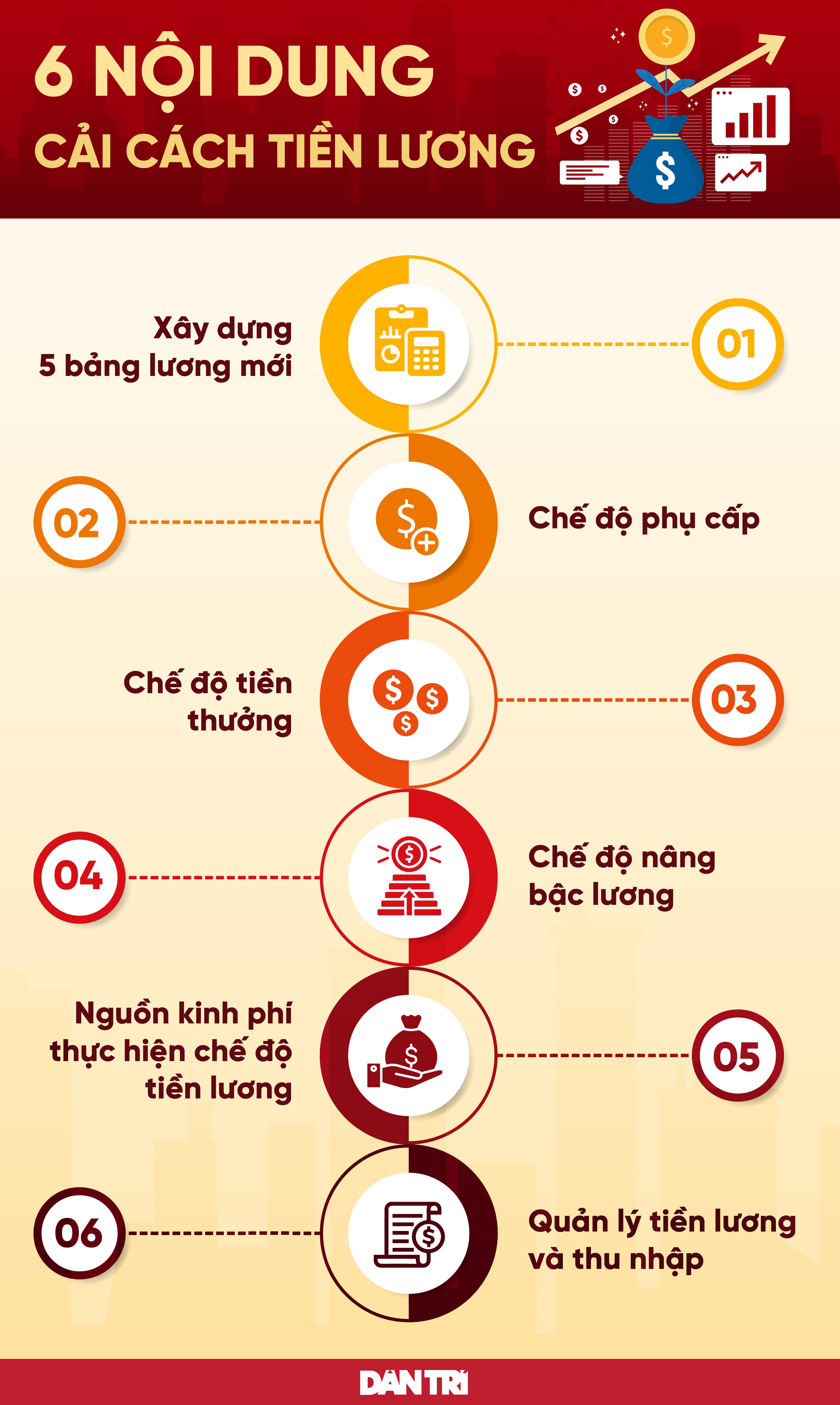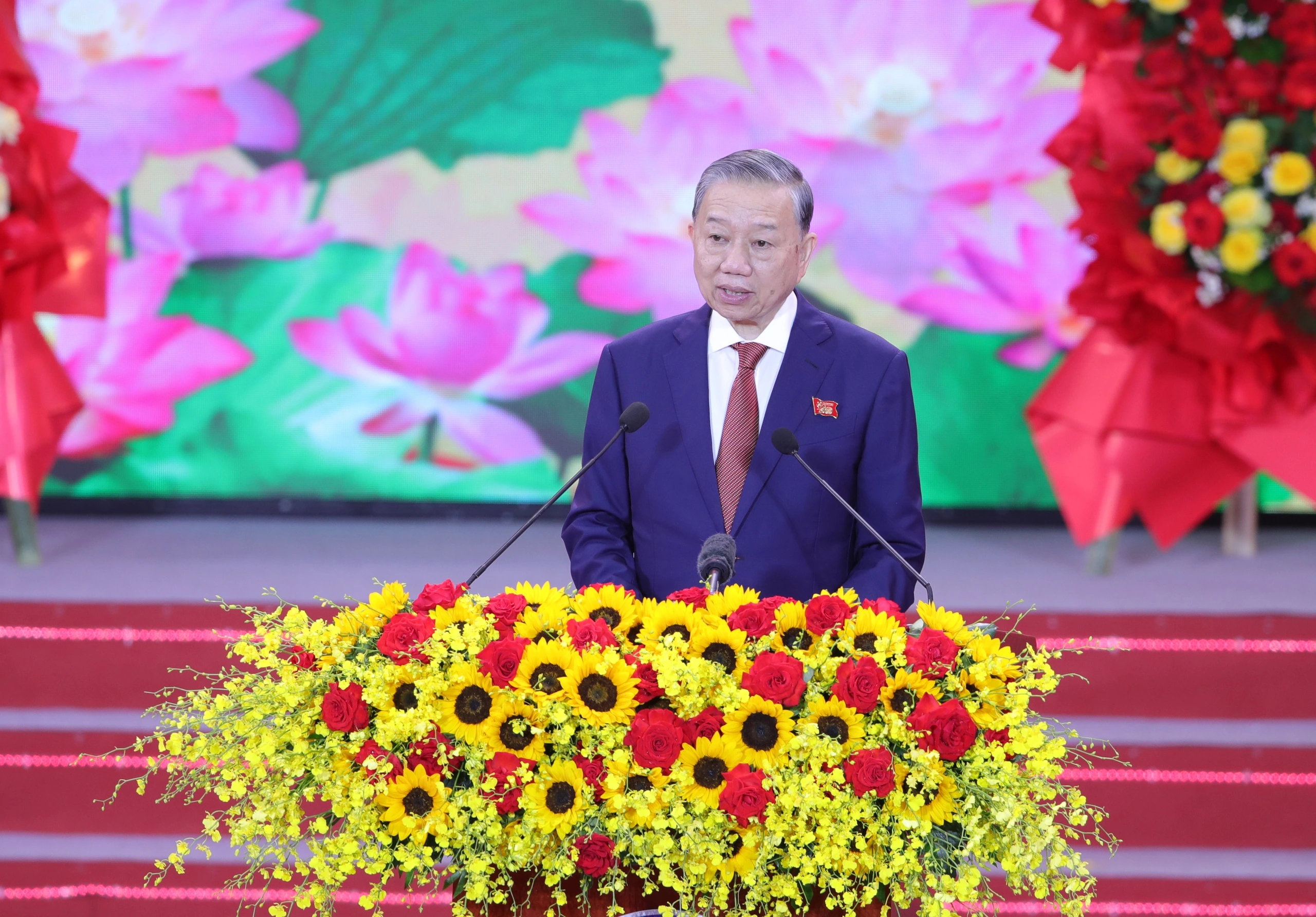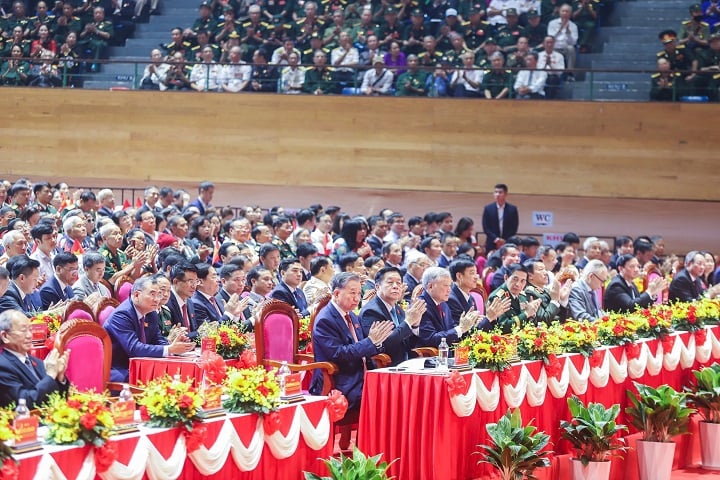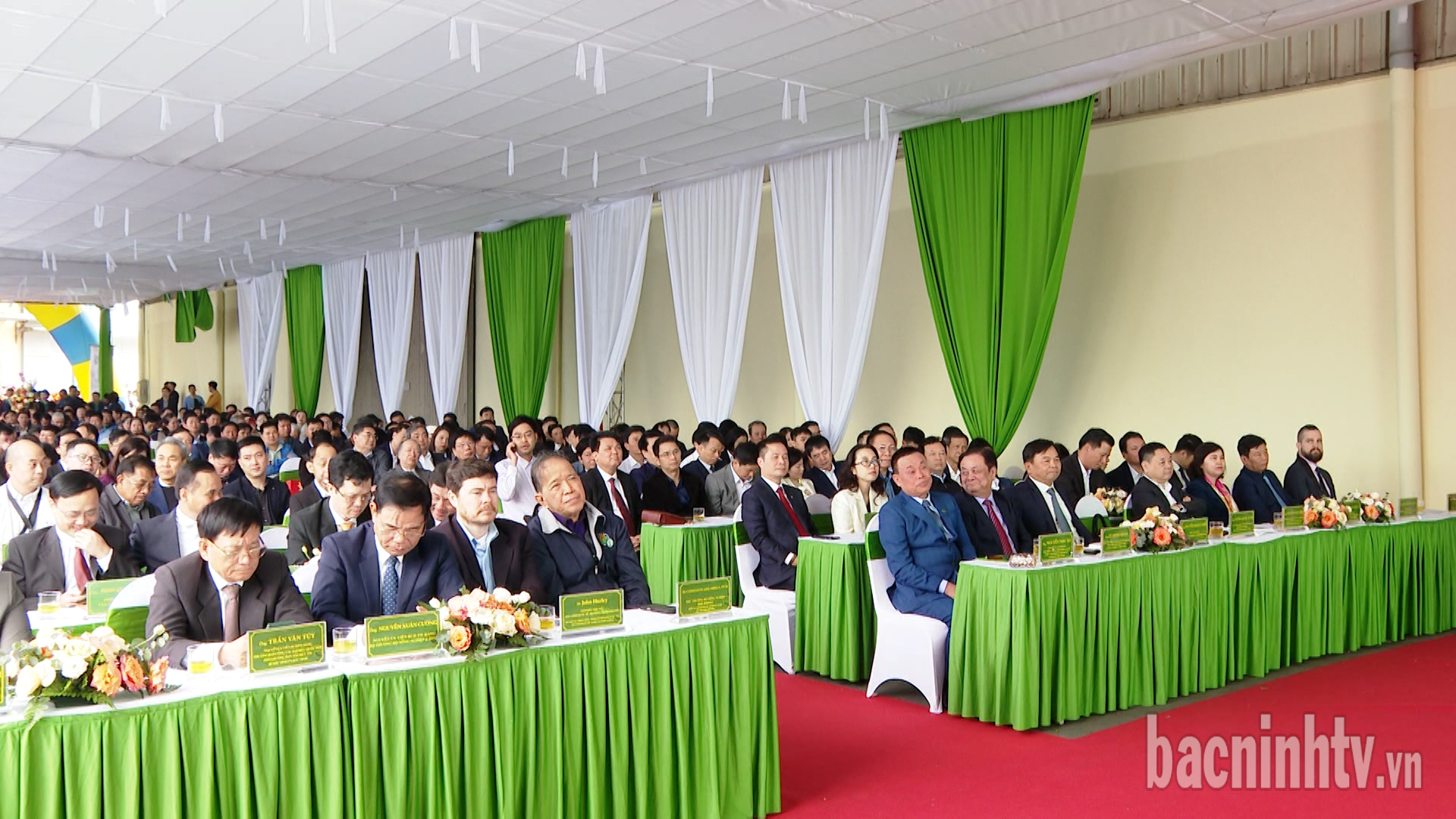This fundamental reform of salary policy according to Resolution 27 of the Central Committee is considered a breakthrough, paying salaries according to job position, "unleashing" to raise salaries for civil servants, managers, and encouraging the profession of... becoming an official.

Sharing the story of salary reform, former Deputy Minister of Home Affairs Nguyen Tien Dinh recalled that Vietnam has undergone many reforms. In 1978, he received a salary of only 56 dong, as an apprentice engineer. Now, the basic salary has reached 1.8 million dong/month. That change in value is nearly half a century, a long journey.
The principle of salary design, according to the former Deputy Minister of the Ministry of Home Affairs, is to fully meet the basic needs of workers such as food, housing, clothing, transportation, raising children, taking care of family, etc.
Previously, wages were built based on calculating a person's daily energy needs (kcal) to convert to the minimum amount of food that must be met, from which the value of a working day was determined.
Up to now, the value of labor is calculated by salary, in addition to the requirement to ensure material needs, it also includes spiritual life.

Mr. Dinh assessed that Resolution 27 sets out breakthrough directions in salary reform when paying salaries according to job positions and management titles. In addition, the basic salary accounts for 70% of the total salary to overcome the problem of non-salary income such as allowances sometimes being more than the current common salary.
The former Deputy Minister of the Ministry of Home Affairs said that in the past, the salary payment method did not encourage officials to work. Therefore, the salary of a manager was only equal to that of an employee, except for the additional responsibility allowance.
Resolution 27 of the Central Committee returns to the principle of paying salaries according to management positions. In addition, salary calculation is also based on labor productivity and work efficiency.
The basic salary is abolished. Instead, each civil servant is paid a certain amount of money according to his job position. According to Mr. Dinh, compared to the very complicated salary scale system, there are up to 12 levels currently applied. With 5 new salary scales according to the orientation, it is possible to build more basic, clear, and concise salary levels.

"Salary reform under Resolution 27 will be a breakthrough when paying salaries according to job positions, defining management and professional positions. The problem here is how to accurately determine job positions," said the former Deputy Minister of Home Affairs.
According to Mr. Dinh, in this reform, it is necessary to build a salary table and calculate the salary level applicable to each position and title, from high-level management leaders at the Central level such as the General Secretary, President, Prime Minister, Chairman of the National Assembly to civil servants and public employees at the grassroots level.
"A leader who is victorious and is paid 500 million VND per month, while their employees receive 10-15 million VND, is better than restraining and limiting the salary of managers to no more than 50 million VND, leaving each cadre and civil servant below with only 3-4 million VND/month," Mr. Dinh compared.
This expert emphasized that salary reform is urgent and necessary in the current period, when it has been "missed" for many years.

National Assembly delegate Nguyen Thi Viet Nga, Deputy Head of the National Assembly Delegation of Hai Duong province, said that salary reform is the "tip of the iceberg". To implement the reform, many different solutions are needed, because recalculating salaries for workers is only one part.

According to the delegates, first of all, we must make real efforts to increase labor productivity. In the annual Government report, experts often mention that Vietnam's labor productivity is low compared to the region and the world.
"Without improving labor productivity, it is difficult to reform wages. When state resources are limited, spreading out wages will not be guaranteed," said delegate Viet Nga.
In addition to salary reform, it is also necessary to promote the restructuring of the public sector salary apparatus. Because maintaining a cumbersome apparatus, even having inefficient departments, makes salary reform very difficult. When there is a streamlined operating apparatus, the effectiveness of salary reform will have a clear change.
"We are restructuring administrative units, public service units and streamlining staff. However, in the coming time, we must continue to do so more effectively to have a streamlined budget-based apparatus," said the female National Assembly delegate.

"Recently, the whole country has implemented solutions to prepare for salary reform," said Dr. Bui Sy Loi, former Permanent Deputy Chairman of the National Assembly's Social Committee.
First, regarding resources, Mr. Loi said that last year, from the central to local levels, 350,000 billion VND was saved to implement salary reform.
After 2 years of being affected by the Covid-19 pandemic, our country has spent nearly 90,000 billion VND to support businesses and workers. This year, it is expected to spend 500,000 billion VND to implement salary reform. This is an effort of the Government, while still having to promote public investment.
Next, it is necessary to mention the arrangement of a streamlined, effective and efficient apparatus. According to the Government's report, in 2021, the number of civil servants in state administrative agencies and organizations under the Government's management decreased by 27,530 positions compared to 2015, to only nearly 250,000 positions.
In addition, nearly 240,000 people working (on the payroll) receiving salaries from the state budget in public service units have been reduced. The number of workers in this group is about 1.79 million people (statistics in 2021).
According to Mr. Loi, the next preparation of the "support" agency for the Government has been to issue basic standards for job titles and positions. For example, the same job position has the same salary. The salary of each person only differs in the factor of seniority. Every year, excellent completion of tasks is rewarded with 10%.
"If the job position is not determined correctly, salary payment will not be accurate," Mr. Loi warned.


In the upcoming salary reform, former Deputy Director of the Center for Human Resource Demand Forecasting and Labor Market Information of Ho Chi Minh City, Tran Anh Tuan, said that salaries must be linked to work efficiency, labor productivity and ensure the principle that public sector salaries must increase faster than average social salaries.
"In parallel with salary reform, Vietnam needs to soon develop specific criteria to evaluate the performance of assigned duties and tasks. Based on this assessment, appropriate salaries will be paid," Mr. Tran Anh Tuan emphasized.
The former Deputy Director of the Center for Human Resource Demand Forecasting and Labor Market Information in Ho Chi Minh City said that it is necessary to develop vocational skills certification training as the main focus. In addition to limiting the use of state budget to support university and post-graduate training for working people, it is necessary to encourage them to study on their own.
This person believes that owning international professional and skill certificates is a new direction in Vietnam and around the world. This not only helps workers have a set of skills to meet the changing job demands every day, but also helps them continuously study, improve their professional qualifications, and update new information and skills to apply in their profession.

When implementing salary reform, Associate Professor Dr. Nguyen Duc Loc, Director of the Institute for Social Life Research, said that it is necessary to research suitable starting salaries for each job position, evaluate according to the professional needs of that job position, and not wait for the "sequential" style.
"It is not possible to base the calculation on the minimum wage. It must be considered that private sector workers are calculated according to the minimum wage because during the working process, there are also opportunities to increase income through overtime and extra work," said Mr. Loc.
This person believes that it is also necessary to create a mechanism for civil servants and public employees to be promoted and have their salaries increased. In addition, there should be a mechanism to delegate autonomy, arrange personnel, and pay salaries according to a predetermined framework based on the professional needs of each job position. The head of the unit can pay salaries according to the job position that requires professional requirements.

The lowest civil servant salary is higher than the highest salary bracket in the private sector.
Regarding the task of submitting to competent authorities a roadmap for implementing comprehensive salary policy reform as required in Resolution No. 27, Minister of Home Affairs Pham Thi Thanh Tra said that the Government has reported to the Government Party Committee to report to the Central Executive Committee and the National Assembly on the results and roadmap for salary policy reform for cadres, civil servants, public employees, armed forces and employees in enterprises.
In particular, the Government has proposed a roadmap for salary reform for cadres, civil servants, public employees and armed forces with 6 salary reform contents, expected to be implemented from July 1, 2024.
After 2024, wages will continue to be adjusted to compensate for inflation and will be somewhat improved according to GDP growth until the lowest wage is equal to or higher than the lowest wage in region I (highest region) of the business sector.
Source link





![[Photo] Prime Minister Pham Minh Chinh and Brazilian President Luiz Inácio Lula da Silva attend the Vietnam-Brazil Economic Forum](https://vstatic.vietnam.vn/vietnam/resource/IMAGE/2025/3/29/f3fd11b0421949878011a8f5da318635)

![[Photo] Dong Ho Paintings - Old Styles Tell Modern Stories](https://vstatic.vietnam.vn/vietnam/resource/IMAGE/2025/3/29/317613ad8519462488572377727dda93)






















































































Comment (0)